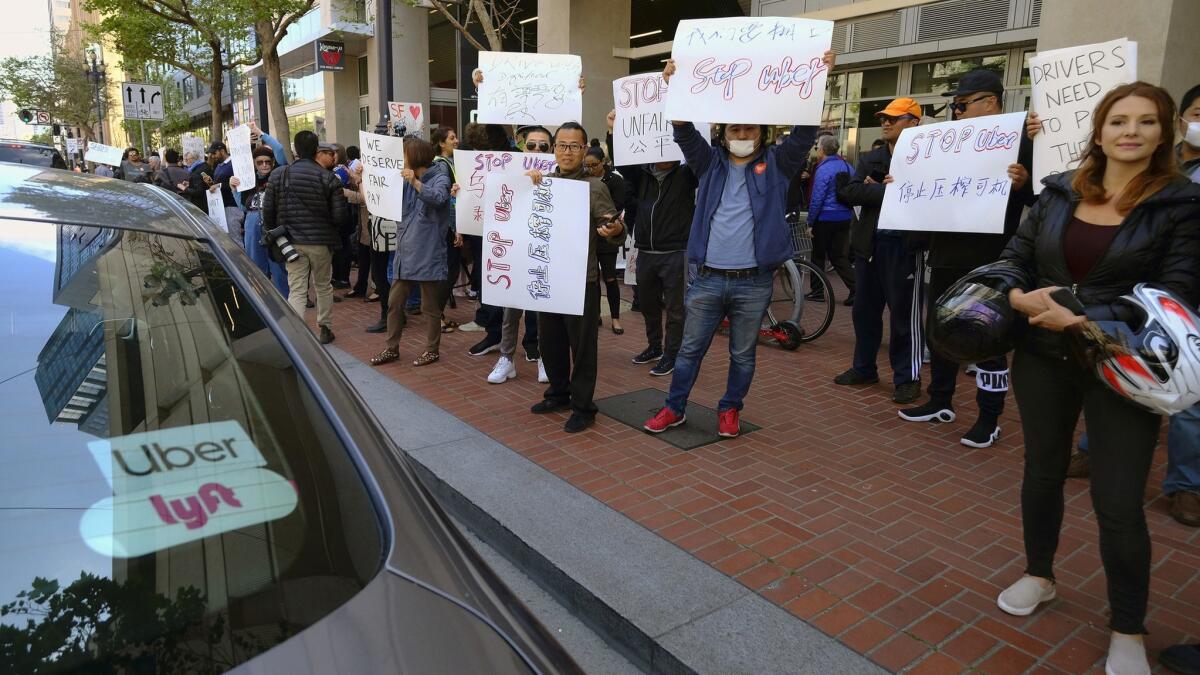Editorial: California legislators could save gig workers — or ruin the part-time economy

California’s Silicon Valley created the “gig economy,” in which on-demand services are powered by on-demand workers, typically working part-time. Now, the California Legislature is considering proposals that could fundamentally change how the companies behind these services treat their workers — for better or for worse.
The central question is whether on-demand workers — like, say, Uber and Lyft drivers who determine their own schedules — will continue to be treated as independent contractors, who aren’t protected by state laws on wages, hours and benefits, or as employees, who are. Union lobbyists and some lawmakers contend that tech companies are gaming the system to exploit workers; they are backing a bill by Assemblywoman Lorena Gonzalez (D-San Diego) that would force on-demand services to treat all their workers as employees.
The companies reply that such a move would rob the system of the flexibility that makes it so attractive to the vast majority of on-demand workers.
Both sides are partly right. On-demand workers need more protection than they’re getting now, and it’s shameful that lawmakers have left key questions about worker rights to the courts. But it’s a risky fantasy to pretend that on-demand workers can be reclassified by companies like Lyft and Postmates as employees and continue to wield the control they crave over their hours and duties. It just won’t happen.
Rather than expanding the definition of who is an employee, a better approach would be to give more wage and labor protections to independent contractors.
The roots of the current debate were planted 15 years ago, when a same-day delivery company called Dynamex Operations West sought to slash its costs by reclassifying all of the drivers it employed as independent contractors. Two drivers in California sued, claiming the reclassification was a pretext to avoid the state’s wage and hour rules, which include requirements to pay at least a minimum wage and provide extra compensation for overtime work.
The case made its way to the state Supreme Court in 2018, where the justices stunned businesses statewide with a sweeping ruling against Dynamex that dramatically expanded the circumstances in which companies had to treat workers as employees, at least where wage and hour rules were concerned. The ruling held that workers were presumed to be employees unless they met certain conditions; a key one is that workers aren’t independent contractors unless they perform “work that is outside the usual course of the hiring entity’s business.”
Gonzalez’ proposal, Assembly Bill 5 would not simply write the Dynamex ruling into law. It would also force companies to offer all of their workers — including those previously treated as independent contractors — unemployment insurance, workers’ compensation and the full panoply of labor protections in addition to minimum wage and overtime laws.
It’s past time for the on-demand companies to provide a safety net for the people who work significant hours for them. At the very least, minimum wage, overtime and workers’ comp requirements ought to apply fully to these services.
But Gonzalez’s approach is overkill. Most of the people who sign up to drive or deliver items for these services do it temporarily and on a part-time basis — it’s a supplement, not a living. According to data gathered by Postmates, of the 275,000 people signed up as delivery workers in California in the first three months of 2019, 91% did not perform a single job. About half left the service after less than 80 days, and about 45% worked for 9 hours or less per week. Yet under the bill, all would have to be considered employees.
Enter the Fray: First takes on the news of the minute »
The resulting costs would inevitably lead companies to impose shifts, scale back hiring, add non-compete rules and exert control over hours and opportunities in ways that they don’t today. And that change would rob workers of one of the main benefits of on-demand work, particularly for people with few job skills: the ability to put in hours entirely on their own schedule, mixing work with their other pursuits however they see fit.
Rather than expanding the definition of who is an employee, a better approach would be to give more wage and labor protections to independent contractors or create a third category for on-demand workers. A coalition of on-demand services supports expanding the protections for gig workers and allowing them to band together to negotiate; it has also proposed to fund a package of benefits that workers themselves would choose from, cafeteria style. That would offer more help to part-time workers than reclassifying them as employees and robbing them of the flexibility and opportunities that attracted them to the work in the first place.
Follow the Opinion section on Twitter @latimesopinionand Facebook
More to Read
A cure for the common opinion
Get thought-provoking perspectives with our weekly newsletter.
You may occasionally receive promotional content from the Los Angeles Times.






